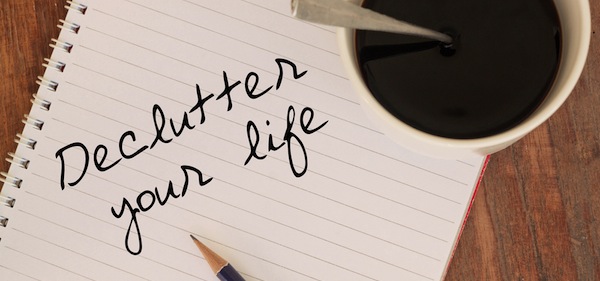Take a look around you. Do you really need all of the things you’ve collected over the years? If the answer is ‘no’ or even ‘not really’, then maybe it’s time to declutter.
The beauty of decluttering is that it not only frees space around the house, but it also clears your headspace and enables you to live a simpler, more efficient life – because too much clutter can make you feel as if your life is out of control. You may also be surprised that living a simpler life will save you time and, perhaps more importantly, money.
A clean and clutter-free living area is also more mentally relaxing than cluttered spaces.
But how will decluttering save you money?
Well, for starters, you’ll buy less. Once you’ve committed to a more frugal lifestyle, you’ll most likely buy fewer groceries and feel a lesser need to keep updating your clothes. You’ll also be able to maximise the use of what you own, mainly because you’ll be able to find things more easily.
You’ll also be more likely to second-guess your future purchases, because, once you’ve decluttered and arranged things accordingly, rather than impulse buying, you’ll want to consider where to store new purchases. If they don’t have a place or real need, then they may not be worth the purchase.
And once you’ve decluttered, you can sell the things you don’t need, which could potentially be a rewarding source of income. In a sense, you’ll be earning money and saving at the same time. But let’s declutter first – we’ll get to the selling part later.
- Decluttering requires commitment. If you don’t think you can see the process through, why not enlist the help of a friend to help keep you on track?
- If you use something regularly, keep it. If you haven’t used it for a year, maybe it’s time to get rid of it. Or if you can’t bring yourself to do so, box the item and store it. If you don’t access that box for another year then get rid of the contents.
- Don’t try and do the whole house at once, do it in small bits, one room at a time.
- When it comes to clearing your drawers, empty them out entirely. Then file anything that’s important, and throw out anything you never use. Be brutal – if it hasn’t seen the light in a year or more, throw it out. Organise your remaining items in viewable sections that are easily accessible.
- Don’t clean when you’re decluttering. It’s easy to become distracted and start cleaning instead of the main job at hand, which is organising and discarding. Declutter first, clean later.
- Once you’ve sorted through your items, leave it a couple of days then repeat the sorting process. With a little separation from the emotional aspect of decluttering, you may find that you feel so good about being free from the clutter that you want to get rid of more stuff.
Once you’re done sifting through your things, put everything you no longer need into one of three piles:
- Rubbish. Only unsalvageable items should go into your rubbish pile. Remember, though, that one man’s trash is another man’s treasure, so, in theory, this should be your smallest pile.
- Donation. If it’s in good quality, but not really worth selling, then put it in your donation pile. Old books, old clothes (in good condition), kitchen utensils or old tools and sports equipment may not be useful to you, but could help someone in need.
- Sale. You may be tidying to free yourself from clutter, but it doesn’t mean you can’t make a tidy profit from your discarded items, some of which you may have spent a lot of money on at the time of purchase. Why not sell them and get some money in return? Next week, we’ll show you how to do just that.
In the meantime, do you have any good tips for decluttering? Why not share them?

